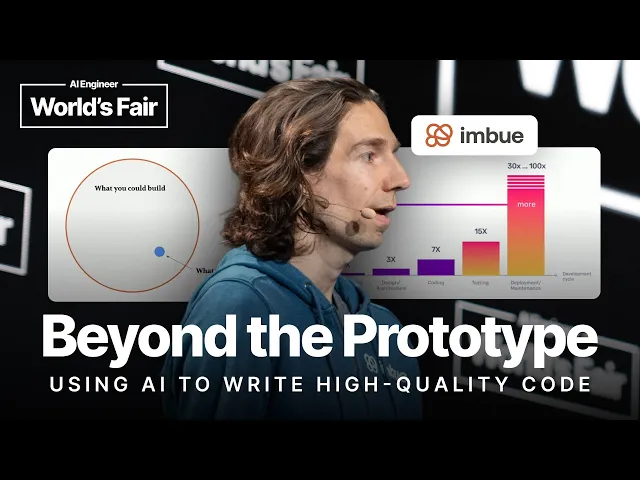Beyond the Prototype: Using AI to Write High-Quality Code

AI automates the "obvious parts" of coding
In the landscape of technology innovation, few developments have garnered as much excitement and speculation as AI-powered coding assistants. Josh Albrecht's presentation on Imbue's advanced coding AI offers a fascinating glimpse into how these systems are evolving beyond simple autocomplete functions to become genuine collaborators in the software development process. As these tools mature, they're beginning to bridge the gap between high-level instructions and production-ready code, potentially transforming how developers work.
Key insights from Albrecht's presentation:
-
AI coding systems are evolving from prototype assistants to production-ready collaborators that can implement complex features from natural language descriptions
-
Current AI systems excel at translating clear requirements into functional code but struggle with ambiguity, requiring humans to provide precise specifications and validate outputs
-
The next frontier involves creating AI that can understand contextual requirements better, reason about potential edge cases, and participate in the full software development lifecycle
The biggest breakthrough: AI's emerging reasoning abilities
The most compelling aspect of Albrecht's talk is the demonstration of AI systems that don't just generate code but can reason about it. Traditional code generation tools could follow patterns and syntax, but newer systems demonstrate a more profound understanding of what the code should accomplish and why certain approaches might be preferred over others.
This matters enormously because it addresses one of the fundamental challenges in software development: translating human intent into machine instructions. The industry has been steadily moving toward higher levels of abstraction, from assembly language to modern frameworks, but the cognitive gap between "what I want the software to do" and "how to instruct the computer to do it" has remained. AI with reasoning capabilities could finally bridge this gap, allowing developers to focus on the creative and strategic aspects of software development while automating the implementation details.
Beyond the video: The real-world impact
What Albrecht doesn't fully explore is how these developments are already transforming software teams outside of research environments. At financial services firm JPMorgan Chase, developers reported 70% time savings on certain coding tasks after deploying GitHub Copilot across their engineering organization. But the benefits weren't just about speed – engineers found themselves learning new patterns and techniques from the AI's suggestions, effectively turning the tool into both a productivity enhancer and a teaching assistant.
The reality is that AI
Recent Videos
How To Earn MONEY With Images (No Bullsh*t)
Smart earnings from your image collection In today's digital economy, passive income streams have become increasingly accessible to creators with various skill sets. A recent YouTube video cuts through the hype to explore legitimate ways photographers, designers, and even casual smartphone users can monetize their image collections. The strategies outlined don't rely on unrealistic promises or complicated schemes—instead, they focus on established marketplaces with proven revenue potential for image creators. Key Points Stock photography platforms like Shutterstock, Adobe Stock, and Getty Images remain viable income sources when you understand their specific requirements and optimize your submissions accordingly. Specialized marketplaces focusing...
Oct 3, 2025New SHAPE SHIFTING AI Robot Is Freaking People Out
Liquid robots will change everything In the quiet labs of Carnegie Mellon University, scientists have created something that feels plucked from science fiction—a magnetic slime robot that can transform between liquid and solid states, slipping through tight spaces before reassembling on the other side. This technology, showcased in a recent YouTube video, represents a significant leap beyond traditional robotics into a realm where machines mimic not just animal movements, but their fundamental physical properties. While the internet might be buzzing with dystopian concerns about "shape-shifting terminators," the reality offers far more promising applications that could revolutionize medicine, rescue operations, and...
Oct 3, 2025How To Do Homeless AI Tiktok Trend (Tiktok Homeless AI Tutorial)
AI homeless trend raises ethical concerns In an era where social media trends evolve faster than we can comprehend them, TikTok's "homeless AI" trend has sparked both creative engagement and serious ethical questions. The trend, which involves using AI to transform ordinary photos into images depicting homelessness, has rapidly gained traction across the platform, with creators eagerly jumping on board to showcase their digital transformations. While the technical process is relatively straightforward, the implications of digitally "becoming homeless" for entertainment deserve careful consideration. The video tutorial provides a step-by-step guide on creating these AI-generated images, explaining how users can transform...
